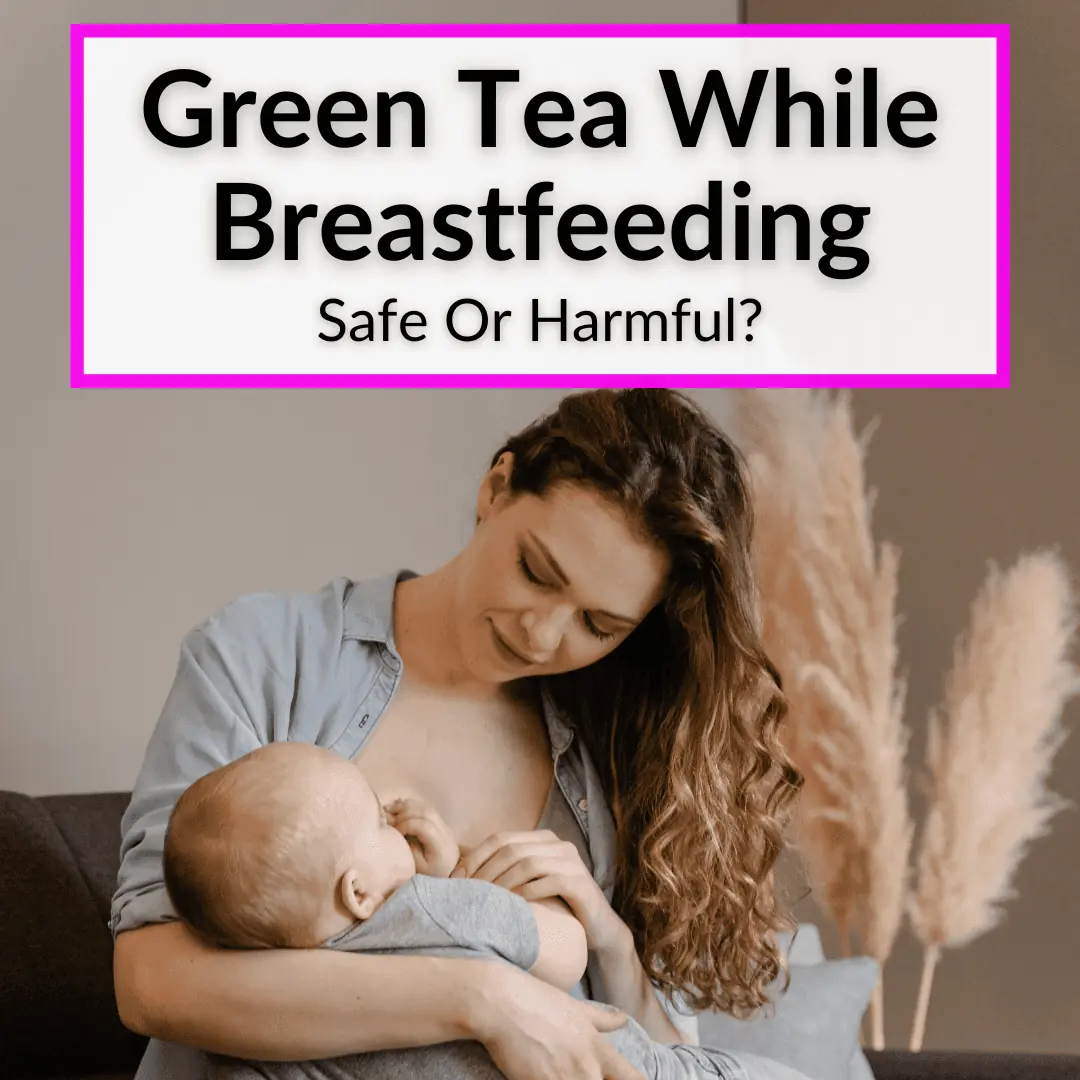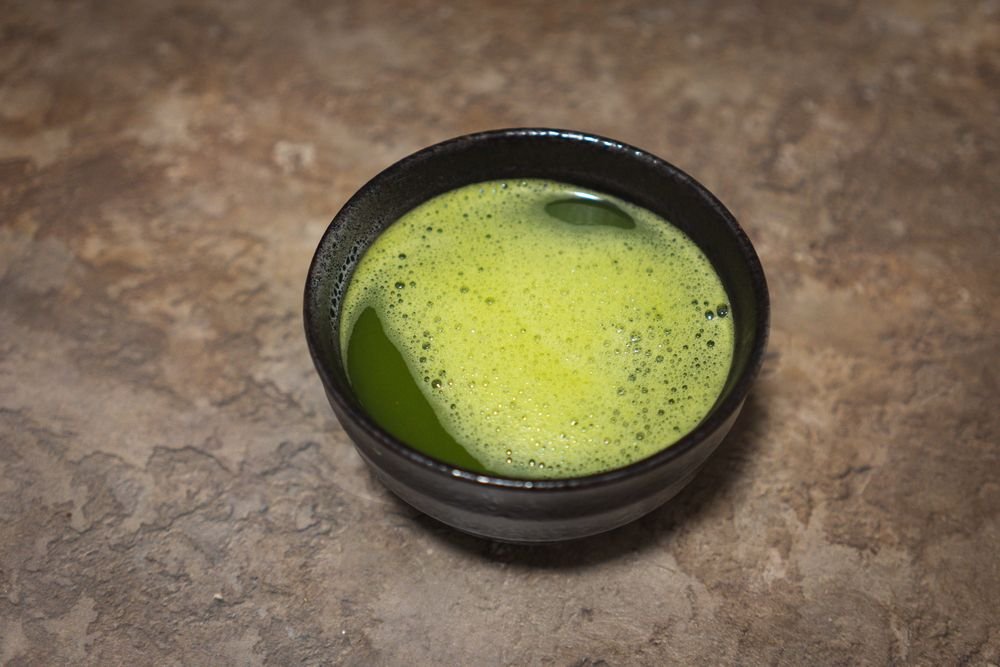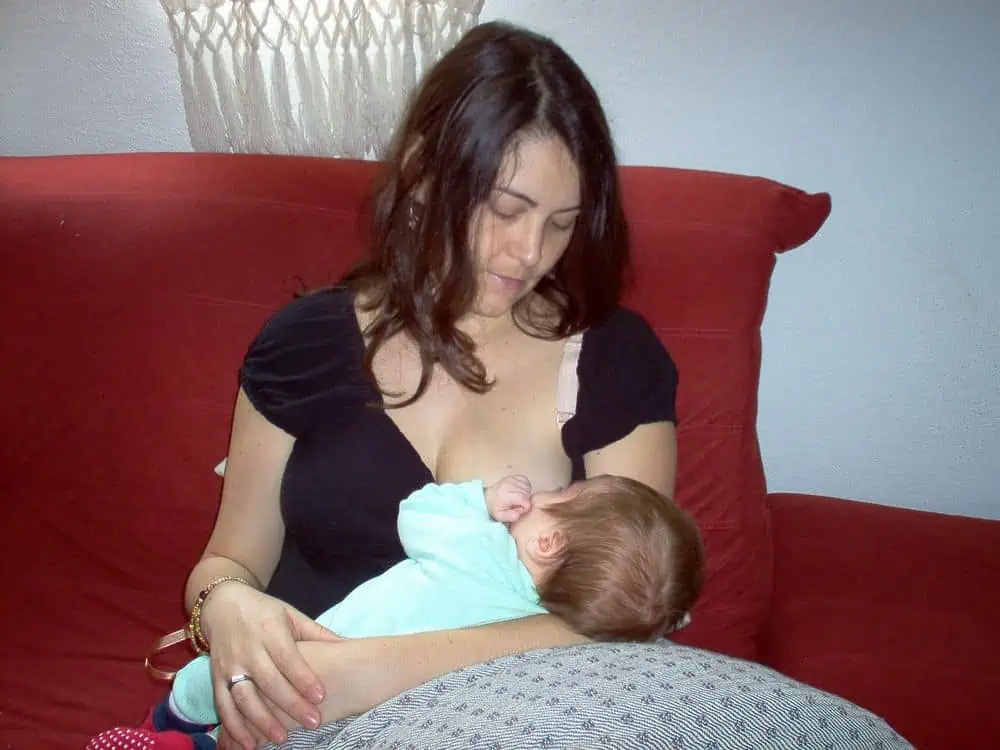
All teas made from the tea plant contain caffeine.
But some contain more than others.
Green tea leaves do not undergo the same oxidation process as oolong teas and black teas.
As a result, a cup of green tea contains less caffeine than a cup of black or oolong tea.
But is it still too much or can you safely have green tea while breastfeeding?
Keep reading to find out. We will look at both regular green tea and matcha green tea (which contains more caffeine) and find out if there is a safe amount of green tea you can drink while breastfeeding and what that safe amount is.
Table of Contents
Can I Drink Green Tea While Breastfeeding?
Yes, you can drink green tea while breastfeeding. But you should limit how much of it you drink, due to the caffeine content. A typical cup of green tea usually contains between 25 and 50 milligrams of caffeine per 8-ounce cup.
This is generally accepted as being a relatively low amount of caffeine, but while breastfeeding, you should be extra careful with your diet. Caffeine in the breast milk can be passed on to your baby.
How Much Green Tea Is Safe While Breastfeeding?
The general consensus is that between 200 and 300 milligrams of caffeine, the equivalent of two or three cups of coffee or black tea per day, is a safe level of caffeine consumption for mothers who are breastfeeding.
But that does not mean you should necessarily have that much. The caffeine in green tea will be detectable in your breast milk, and poor sleep patterns have been reported in the infants of breastfeeding mothers who consume high levels of caffeine.
So how much green tea per day is good? To be safe, stick to a cup or two per day. And if you notice any difference in the sleep patterns of your baby, you may want to avoid caffeine altogether while breastfeeding.
Is there an age when it becomes safe to give a child tea? You can give your baby tea once he or she is six months or older, but only in moderation. Before the age of six months, it is best to only feed your infant breast milk or formula.
Green Tea And Caffeine
The actual amount of caffeine in a cup of green tea varies. Whether you make your own green tea at home or buy one from a coffee shop or store, there is always going to be some variation in the caffeine levels.
Different types of green tea grow in different areas, use different cultivars, and have different production processes. All of those factors results in varying amounts of caffeine in the leaves.
The best way to gauge how much caffeine is in a cup of green tea is to check the product label. Whether you buy green tea leaves or a ready-made bottle of green tea, you should be able to find the amount of caffeine contained therein.
And you may be surprised by the differences between brands.
For example, a twelve-ounce serving of Lipton Brisk Green Tea contains 6 milligrams of caffeine, which is the equivalent of 4 milligrams per 8-ounce serving.
On the other hand, a 20-ounce serving of Nestea Peach Green Tea contains 42 milligrams of caffeine, which works out at just shy of 17 milligrams per 8-ounce serving.
While there is some difference between those two, a look at a Starbucks Green Tea Creme Frappacino reveals there to be the equivalent of 50 milligrams per 8-ounce serving—quite the difference.
For lower levels of caffeine, you could opt for a decaffeinated green tea. But be aware that, although they contain much less caffeine than regular green tea, they are not entirely caffeine-free.
Can I Drink Matcha While Breastfeeding?
Matcha tea is widely vaunted for its antioxidant content and the purported matcha health benefits, but it is also a true tea, made from the Camellia sinensis plant.
And it does also contain caffeine. Much more than other teas, in fact. The leaves used to make matcha tea powder come from tea plants that have been grown in the shade, which leads to them containing more caffeine than leaves from tea plants that have been grown in full sun.
In addition, when you drink matcha, you consume the entire leaf. With other types of tea, you discard the leaf and only drink the essence. Consuming the entire leaf means you get all of the caffeine in the leaf.
According to a study published on PubMed Central, matcha tea contains between 18.9 and 44.4 mg/g (note that’s milligrams per gram, not milligrams per 8-ounce serving).
The content of caffeine in green teas was found to fall within the range of 11.3 to 24.67 mg/g, and most coffee beans will contain between 10 and 12 mg/g of caffeine.
The amount of caffeine that is contained within each serving depends on the amount added when preparing your drink. But as you can see, matcha tea contains comparably higher levels of caffeine per gram.
However, when making hot beverages, you use more grams of coffee per cup than you would grams of tea. That is why a cup of coffee can contain as much as 100 grams of caffeine, which is much higher than the 50 to 70 grams found in a cup of matcha tea.
If you’re looking to reduce your caffeine intake while breastfeeding, regular green tea may be a better choice than matcha green tea. But it also depends on how you make your drink or which brand you choose.
How Much Matcha Is Safe While Breastfeeding?
As mentioned, some caffeine can be passed to the infant through the milk. Plus, babies process caffeine more slowly, meaning it stays in their system longer.
The CDC reports that when a mother’s caffeine intake is low (meaning around 300 milligrams or less per day), there is no adverse effect on her baby. But if the mother consumes higher amounts, babies can become more restless and their sleep patterns can become more erratic.
Since a cup of matcha typically contains 50 to 70 grams of caffeine (with a lot of variation, depending how much powder you use), you could have up to four cups. But I would err on the safe side and limit myself to a cup or two per day.
Safe Teas When Breastfeeding
If you enjoy a cup of green tea but are looking to reduce your caffeine intake while breastfeeding, you might consider herbal teas. Most herbal teas contain little to know caffeine. Here are some good ones to try.
- Chamomile Tea
- Ginger Tea
- Peppermint Tea
- Dandelion Tea
- Rose Hip Tea
Some of common herbal teas actually promote breast milk production. Teas containing fenugreek, blessed thistle, fennel, stinging nettle, goat’s rue, moringa, and milk thistle are considered the best options. We have an article comparing matcha vs moringa, if you are wondering how the two green powders stack up.
High-Caffeine Teas To Avoid When Breastfeeding
If you’re looking at which teas you can enjoy while breastfeeding, you should be aware of the teas with the highest caffeine levels so you can avoid drinking too much of those. Black teas and oolong teas contain the most caffeine.
Black tea contains the highest amount of caffeine among teas, with caffeine levels ranging between 64 and 112 milligrams per 8-ounce serving.
Oolong tea, which contains between 29 and 53 mg of caffeine per 8-ounce serving, is the next highest on the list and also tends to contain more caffeine than green tea. But it does depend on the oolong, since there is a large range. Some are closer to green tea, while others are closer to black.
Green Tea While Breastfeeding: Final Thoughts
It is generally safe to have some green tea while breastfeeding, as long as you don’t overdo it. The same goes for drinking green tea when you are pregnant. Limit yourself to a cup or two per day, whether it is regular green tea or matcha, and you should be fine.
That said, if you notice a disruption in the sleep patterns of your infant, or a change in behavior, you might consider refraining from any caffeine consumption. Herbal teas make a good caffeine-free alternative.



Leave a Reply